Key takeaways:
- Homeless charity work focuses on restoring dignity and building community connections, not just providing basic needs like food and shelter.
- Cooking classes empower individuals with practical skills, fostering a sense of accomplishment, community, and independence.
- Personal experiences in cooking highlight the importance of patience, teamwork, and creativity as essential life lessons.
- Skills learned in cooking can be used to uplift others, creating a sense of belonging and positively impacting the local homeless community.
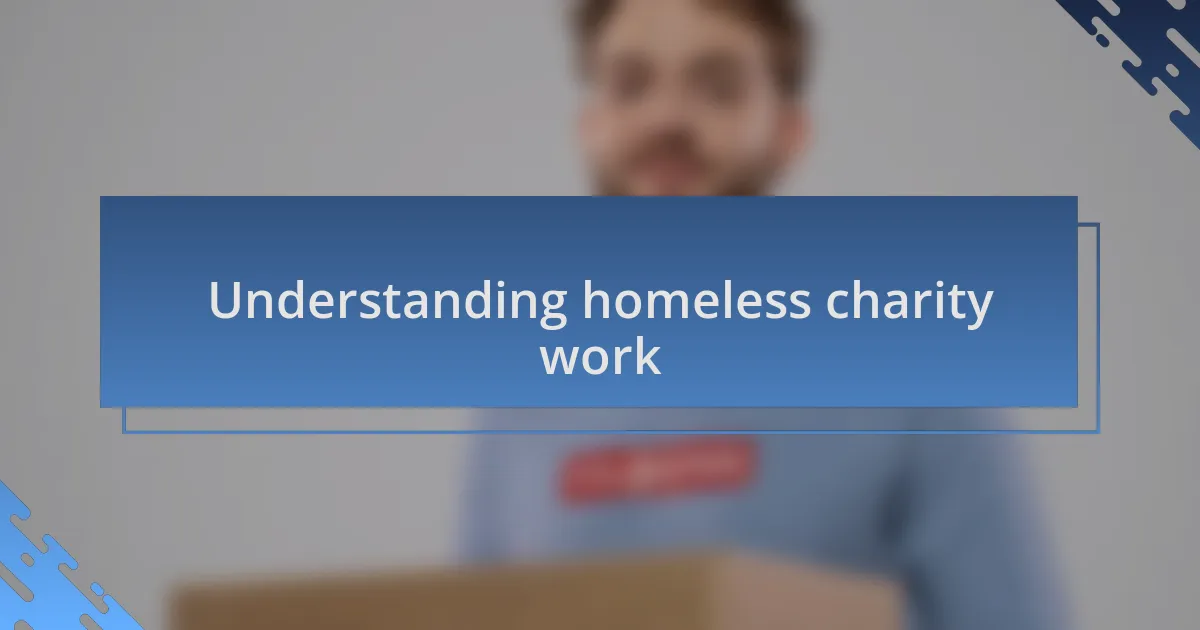
Understanding homeless charity work
Homeless charity work goes beyond just providing meals or shelter; it’s about restoring dignity and offering a pathway to stability. I remember volunteering at a local shelter where a gentleman shared how losing his job spiraled into losing everything, including hope. It made me ponder—how many people are just a paycheck away from experiencing a similar fate?
As I observed the interactions between volunteers and residents, it struck me how vital a sense of community is in this work. People often underestimate the power of simply listening and being present. Could a single conversation be the turning point for someone struggling with homelessness? From my perspective, those moments of genuine connection are just as vital as distributing food or resources.
I’ve seen firsthand the impact that tailored programs have on individuals seeking help. A project I was involved in provided not just shelter but also job training and mental health support. It was beautiful to witness someone transform from feeling lost to gaining confidence in their abilities. This experience reinforced my belief that understanding the individual stories behind homelessness allows us to create more effective and compassionate support systems.
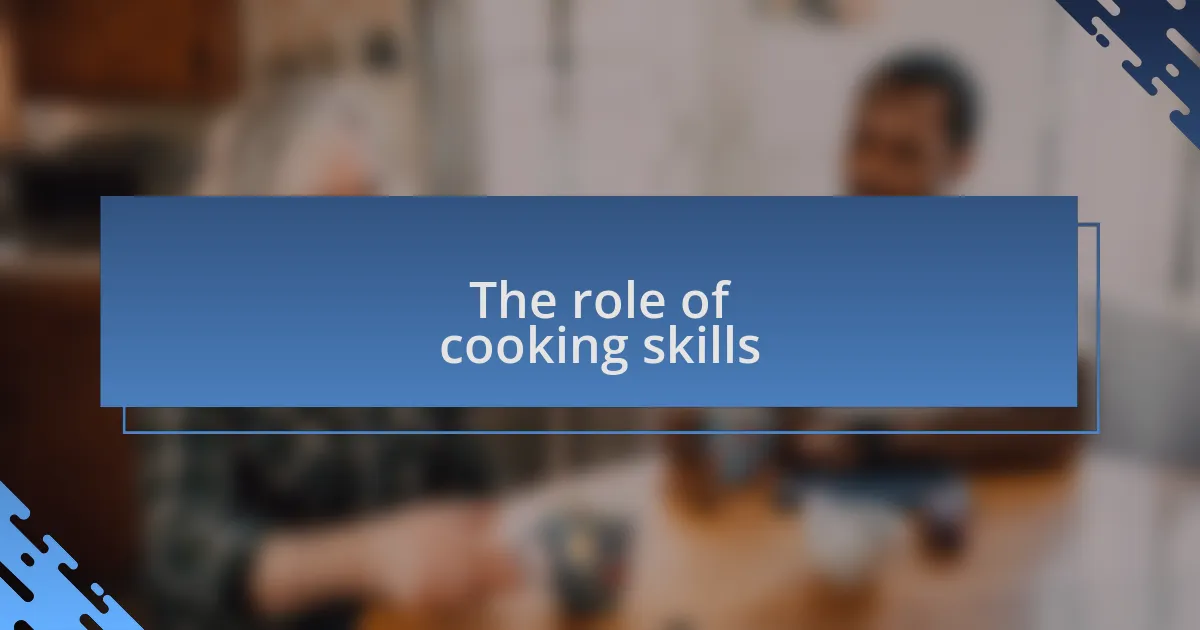
The role of cooking skills
Cooking skills play a pivotal role in the lives of individuals facing homelessness. During a recent cooking class I attended, I noticed how learning to prepare meals didn’t just teach technique but also instilled a sense of accomplishment. Have you ever chopped vegetables and felt a sense of pride in the simplicity of creating something nourishing? It’s a small victory that can spark hope.
In my experience, cooking classes serve more than a practical purpose; they foster community and build relationships. I watched as participants, who were initially strangers, bonded over shared recipes and kitchen mishaps. Isn’t it fascinating how the act of cooking can break down barriers and create a sense of belonging? When individuals feel connected, they are often more motivated to pursue other avenues of support.
Moreover, cooking empowers individuals with a skill that can lead to independence. I remember a story of a woman in our program who used her newfound culinary skills to not only feed herself but also to cater for local events. What a transformative moment it was when she realized that these skills could change her life’s trajectory! Learning to cook can be a foundational step toward sustainable living and emotional stability.
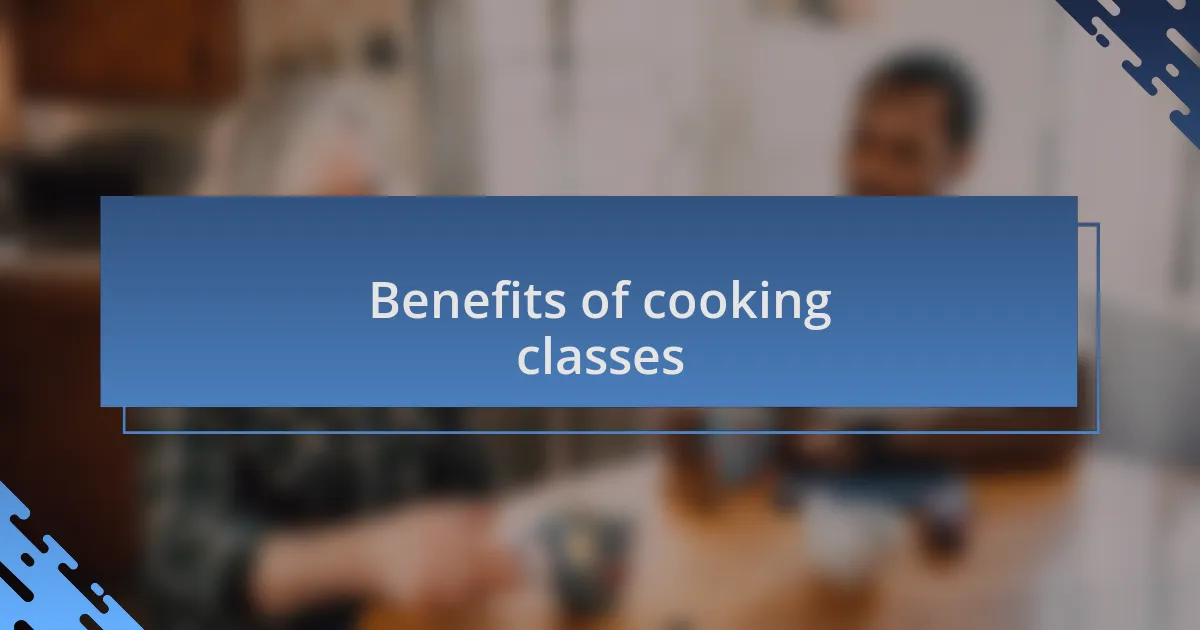
Benefits of cooking classes
Cooking classes offer numerous benefits that can profoundly impact personal growth and wellbeing. I recall a group session where a shy participant, usually quiet, unveiled extraordinary culinary creativity. Each dish they prepared became a canvas for self-expression, reflecting their personality. Isn’t it remarkable how cooking not only nourishes the body but also nurtures the soul through creativity?
One of the key advantages of these classes is the fundamental life skills they promote. I vividly remember guiding someone through the process of making a simple pasta dish. As they mastered the art of boiling and seasoning, I could see their confidence soar. It’s true: mastering these small techniques can lead to a greater sense of control in one’s life. Have you ever considered how cooking can turn into a metaphor for life itself, where you learn to mix various ingredients to create something wonderful?
Additionally, these classes often create an environment filled with laughter and camaraderie. There was a moment in one class when everything seemed to go wrong—the ingredients spilled, and laughter erupted. It was in that chaos that bonds were formed, and I saw firsthand how cooking can transform anxiety into joy. Aren’t shared experiences like these pivotal in helping individuals rebuild their self-esteem and a sense of community?
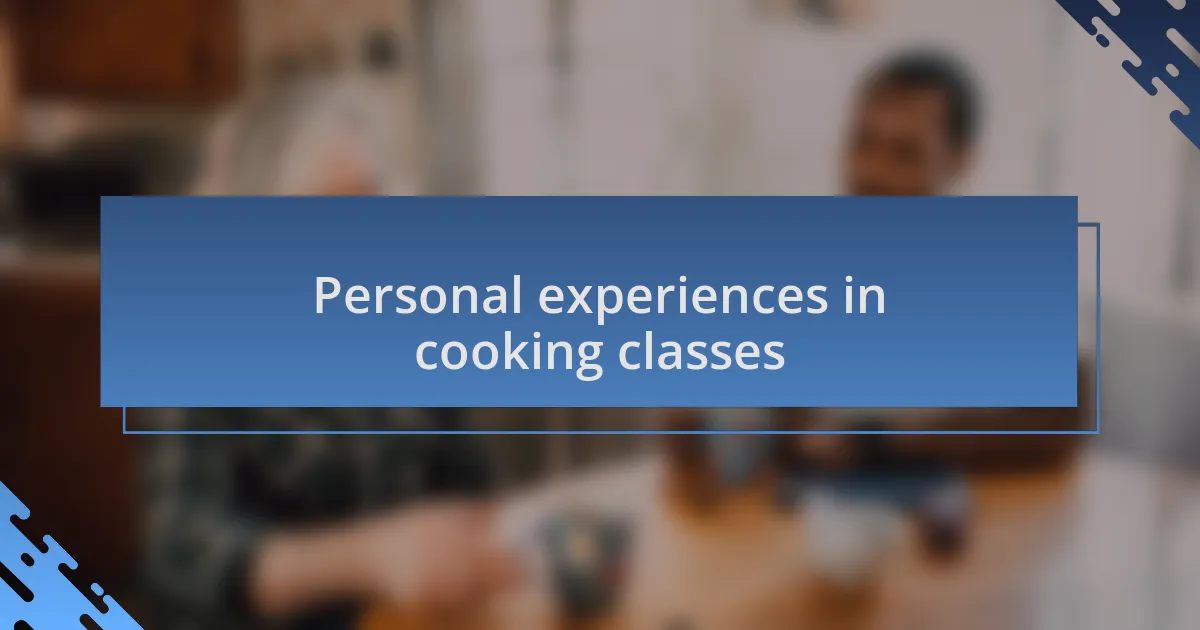
Personal experiences in cooking classes
Being in a cooking class was like stepping into a world where the aroma of spices ignited not just hunger but also a sense of belonging. I remember the first time I tried to make sushi; my hands were trembling as I fumbled with the sticky rice and seaweed. That initial struggle ignited a sense of determination within me. Isn’t it fascinating how facing a challenge in the kitchen can spark a newfound passion for cooking, or even inspire a sense of community among peers who struggle together?
Another memorable moment was when a fellow participant and I teamed up for a baking session. As we mixed flour and sugar, we shared stories about our favorite family recipes, blending our personal histories into the dough. I never realized that food could serve as such a powerful storyteller, weaving our experiences into each culinary creation. Could it be that cooking is not only about satisfaction but also about connecting our past with our present?
I distinctly recall a day when we tackled a complex dish that seemed daunting at first. The instructor’s encouragement made all the difference, pushing me to experiment with unfamiliar flavors. In that class, I learned that it’s okay to fail; sometimes a dish doesn’t turn out as planned, but that’s part of the learning curve. Have you ever felt that rush of excitement when you finally nail a recipe after several attempts? It’s a reminder that perseverance can lead to delightful surprises in both cooking and life.
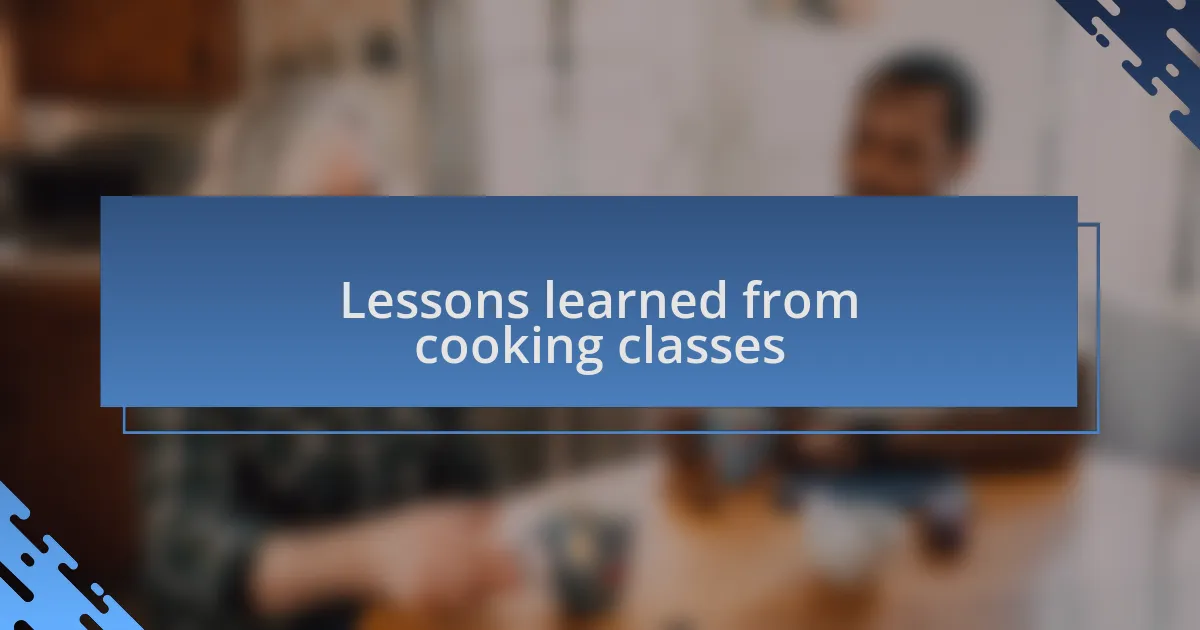
Lessons learned from cooking classes
Cooking classes taught me the importance of precision and patience. I remember one evening when we were tasked with chopping vegetables for a stir-fry. I rushed through the process, thinking speed was key, only to end up with uneven pieces that cooked inconsistently. That frustration taught me that taking the time to do things right can enhance the final result significantly. Have you ever found that slowness can actually lead to better outcomes in unexpected ways?
Another valuable lesson was the joy of teamwork. During a class focused on making sauces, we partnered up and shared our unique techniques. I discovered that collaborating with others not only made the cooking process more enjoyable, but it also opened my eyes to different perspectives on flavor and texture. It’s amazing how sharing ideas can transform a simple dish into something extraordinary, isn’t it?
Finally, the classes emphasized creativity. One day, we were encouraged to create our own pizza from scratch. As I combined toppings that I loved, it struck me how food can reflect personal tastes and styles. I felt empowered to think outside the box when it comes to flavors, proving that cooking is just as much about self-expression as it is about following recipes. Have you ever created something entirely new in the kitchen that captured your personality?
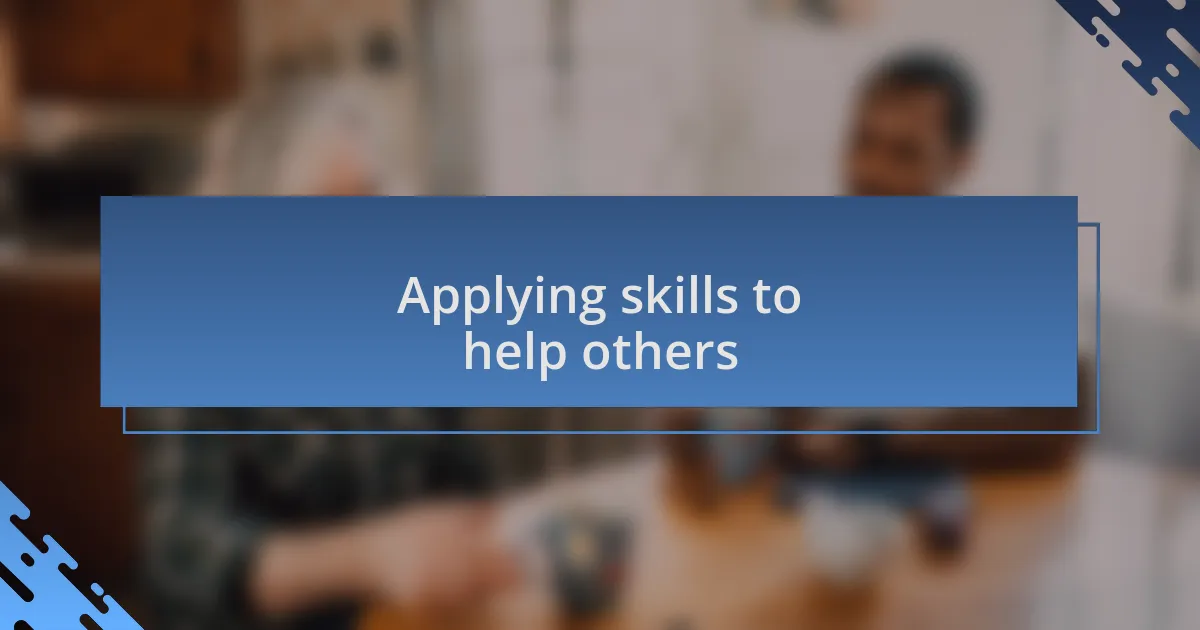
Applying skills to help others
Cooking skills can easily be transferred into efforts that uplift others. I recall volunteering at a local shelter where I used my newfound abilities to prepare a warm meal for those in need. It was a humbling experience to serve others, reminding me that a simple plate of food carries immense value. Have you ever felt the deep connection that comes from sharing a meal with someone?
In another instance, I organized a cooking workshop to teach basic culinary skills to at-risk youth. Watching their faces light up as they chopped vegetables or stirred a pot was truly rewarding. I realized that teaching these skills offered them not just nourishment, but also confidence and a sense of accomplishment. Isn’t it powerful to think that something as ordinary as cooking can help shape a brighter future for someone else?
When I experimented with meal planning for my community’s food drive, it became clear how vital organization is in helping those struggling with food insecurity. I drew on my cooking class experiences to create a balanced menu that catered to diverse dietary needs. It was fulfilling to see how these small yet significant decisions contributed to a larger goal of support and care for those around us. Have you ever considered how your skills could enhance the lives of others in your community?

Impact on local homeless community
Cooking classes have not only enriched my culinary skills but have also ignited a passion within me to actively contribute to the local homeless community. One memorable day at a soup kitchen, I taught individuals experiencing homelessness how to make a simple yet delicious vegetable stew. Their laughter and eagerness to learn reinforced the idea that cooking is not just about nourishment; it’s also a means of sharing warmth and fostering connections. Have you ever witnessed how a shared cooking experience can transform an atmosphere of despair into one filled with hope?
Building on this experience, I collaborated with other volunteers to host a weekly cooking night for those in need. As we gathered around the kitchen, different stories unfolded—enough to make anyone pause and reflect on their own circumstances. I remember a man sharing how he had lost his job and, with it, his ability to provide for his family. When we prepared meals together, it felt like we were cooking more than just food; we were also stirring a sense of belonging and community amongst individuals who often feel invisible. What could be more uplifting than realizing that, through cooking, we can create a safe space for camaraderie?
Moreover, I’ve seen firsthand how these cooking initiatives can lead to tangible benefits for the community. After participating in one of our workshops, some attendees began to recreate the dishes at home, transforming their approach to food and nutrition. It became evident that by equipping individuals with cooking skills, we weren’t just filling stomachs; we were empowering them to find joy and pride in preparing meals for themselves and their families. Isn’t it amazing how something as simple as a cooking class can ripple out, creating lasting change in people’s lives?